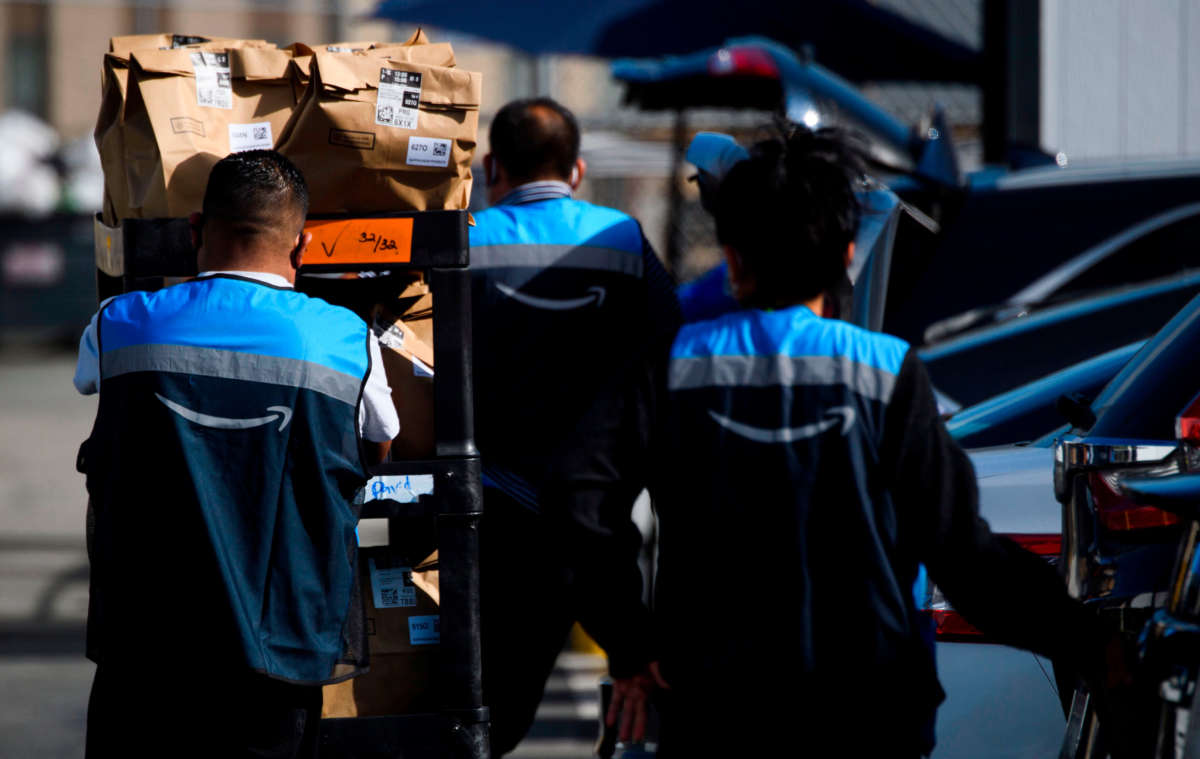Internal Amazon documents leaked to The Intercept show that the company is aware of their drivers urinating and defecating in their trucks in order to meet overwhelming productivity demands and avoid losing their jobs.
On Wednesday, Amazon implied that its drivers are lying if they say, as previous reporting has shown, that they are forced to urinate in their trucks because of strict time constraints for deliveries. Amazon CEO Dave Clark also claimed that they were a “progressive workplace.”
The company made the implication in response to a tweet criticizing Amazon by Rep. Mark Pocan (D-Wisconsin). “Paying workers $15/hr doesn’t make you a ‘progressive workplace’ when you union-bust & make workers urinate in water bottles,” he tweeted.
“You don’t really believe the peeing in bottles thing, do you?” tweeted the official Amazon News account in response. Reporting has roundly shown that many Amazon drivers often have to urinate in bottles to meet quotas set by the company.
Get our free emails
Amazon News’s response has been fiercely criticized, including by people like Rep. Jamaal Bowman (D-New York). “Maybe if this social media manager had a union, they wouldn’t be forced to propagandize for Jeff Bezos to earn a paycheck,” Bowman tweeted.
Maybe if this social media manager had a union, they wouldn’t be forced to propagandize for Jeff Bezos to earn a paycheck. https://t.co/OXA6I4Rc8J
— Jamaal Bowman (@JamaalBowmanNY) March 25, 2021
Documents leaked to The Intercept on Thursday show that the company has been covering up their inhumane labor practices.
One document from January details a list of “violations and defects” for employees, including “public urination” and “public defecation.” The document is labeled as “confidential,” according to reporting by The Intercept’s Ken Klippenstein. Klippenstein also obtained an email sent to employees by an Amazon manager last year chastising employees for urinating in bottles and defecating in bags while delivering packages.
“This evening, an associate discovered human feces in an Amazon bag that was returned to station by a driver. This is the 3rd occasion in the last 2 months when bags have been returned to station with poop inside,” the email reads. “We understand that DA’s [driver associates] may have emergencies while on-road, and especially during Covid, DAs have struggled to find bathrooms while delivering.”
The manager also noted that they can scan QR codes on bags with unsanitary items left inside in order to determine who had them last. The email does not offer solutions for drivers who don’t have time to use the restroom while on shift but does say that urinating in bottles is a “Tier 1” infraction, which employees say can lead to termination.
Email from Amazon logistics manager: “This evening, an associate discovered human feces in an Amazon bag that was returned to the station by a driver. This is the 3rd occasion in the last 2 months when bags have been returned to the station with poop…”https://t.co/m6SK8QlRtF pic.twitter.com/vx3LG4sZrp
— Ken Klippenstein (@kenklippenstein) March 25, 2021
Halie Marie Brown, a former driver for an Amazon delivery contractor, told The Intercept that drivers have to urinate and defecate in the truck because “We are literally implicitly forced to do so, otherwise we will end up losing our jobs for too many ‘undelivered packages.’” Brown had received a separate email from a manager last year instructing drivers to search their trucks for bottles with urine in them when they leave to begin delivering packages in the morning.
Despite management knowing about the practice, however, Brown said that they only increased the pressure on drivers to work faster.
While drivers can be fired for urinating in a bottle in their truck, workers have said that going off-route to find a restroom would be much more likely to lead to termination.
“I can tell you that if I drove to find a restroom that I would be bringing back packages every night and that would eventually mean I would get infractions, which would lead to termination,” one Amazon driver told Vice. Amazon drivers often have to deliver 300 packages over the course of 10 hours. The more packages they deliver, employees say, the more overtime they earn.
Such inhumane conditions and extreme pressure by management have caused Amazon workers to consider forming a union in Alabama, where a vote to unionize is currently underway. The company is scrambling to suppress the effort and contain their public image as the union effort gains the support of politicians like Sen. Bernie Sanders (I-Vermont) and the impetus for unionization spreads to other Amazon workers across the country.
Press freedom is under attack
As Trump cracks down on political speech, independent media is increasingly necessary.
Truthout produces reporting you won’t see in the mainstream: journalism from the frontlines of global conflict, interviews with grassroots movement leaders, high-quality legal analysis and more.
Our work is possible thanks to reader support. Help Truthout catalyze change and social justice — make a tax-deductible monthly or one-time donation today.
